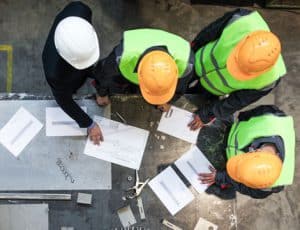
Finding a job in the construction industry presents many opportunities for growth and benefits. One of the biggest benefits of a career in construction is the high salary.
The National Center for Construction Education and Research (NCCER) conducted a survey to collect the average salaries across various construction craft careers. Based on the data from the survey, here are the top 15 highest-earning construction careers:
Without HVAC technicians, our homes and workplaces would be a lot less comfortable! HVAC technicians maintain and install the heating, ventilation and air conditioning systems in buildings. HVAC systems are very complex, so if you enjoy working with technology and troubleshooting, a career within HVAC might be for you. To get started in HVAC you will need to attend some sort of school or training program.
Electricians are responsible for the wiring that powers our cell phone chargers and the systems that keep large factories running. They install the electrical ad power system in new and existing structures. To become an electrician, you will need to attend some sort of electrical education or training program. If you enjoy numbers and are detail-oriented, you might want to look more into a career as an electrician.
Boilermakers manufacture and install boilers, tanks and other large vessels that contain liquid and gases. Boilermaking involves similar equipment as welding and pipefitting, giving the opportunity to move through different careers in the construction industry. If you enjoy numbers and figuring out solutions, boilermaking might be a great career option for you.
Pipefitters install and maintain heavy-duty piping systems that contain and transport chemicals and gasses. To become a pipefitter, you must have some experience with technical school or an apprenticeship program. Pipefitters often work in industrial settings, enjoy troubleshooting problems and being active.
Riggers are responsible for attaching loads to cranes using cables, hooks and other equipment. If you enjoy working with a team, being outside and are good with numbers, you may want to consider a career as a rigger. You must have an understanding of physics, balance and weight distribution to be successful as a rigger.
If you enjoy putting things together, you’ll be interested to learn about millwrights. Millwrights assemble and maintain machinery on construction sites, power plants and factories. If you enjoy troubleshooting problems, understanding complex manuals and specialized tools, a career as a millwright might be for you.
If you want to be the first person to check out a new project site, a surveyor might be a great career option for you. Surveyors measure and collect data from a construction site that are crucial to the development of the project. They use blueprints, utility maps and computer models to complete their work. You’ll need some technical school experience, an apprenticeship or a training program.
Construction site safety technicians oversee protective safety procedures, inspections and training for construction projects. Safety technicians are a valuable asset to any job site. They must have an attentive eye and excellent communication skills. To begin a career in construction safety, you’ll need technical school experience or an industry training program.
Do you love playing video games? Well, a mobile crane operator might be the career for you. These people drive and control cranes that move around job sites (talk about a giant joystick). Mobile crane operators must have a strong understanding of physics to be successful in their career. You’ll need to attend technical school, community college, or a registered apprenticeship or industry training program.
A plumber is responsible for installing and maintaining the pipes and valves that make up a building’s water and drainage systems. Plumbers are essential to a sanitary and healthy society as they remove waste and distribute clean water. To become a plumber, you’ll need to attend technical school, community college, or a registered apprenticeship or industry training program.
If you enjoy seeing sparks fly, then a career in welding might be an option for you! Welders fuse materials and objects together by applying heat or pressure. Welders have the opportunity to use their creative side by incorporating flames, electricity, or other welding techniques to melt different pieces of metal together and allow them to cool to create a strong bond. You’ll need some technical school, community college or apprenticeship experience.
Tower crane operators control the tall tower cranes that lift materials in the construction of skyscrapers and other large structures. If you aren’t afraid of heights and enjoy the outdoors, a tower crane operator might be a great career option for you. To become a tower crane operator, you will need to attend either technical school, community college, a registered apprenticeship or an industry training program.
Instrumentation technicians test, install and repair instruments and electronic devices that make measurements and control machinery. If you like computers, troubleshooting problems and are detail-orientated, an instrumentation technician might be an option for you. You’ll need to attend some sort of technical school or an apprenticeship program.
Power line workers are essential in keeping the electricity flowing throughout our cities. Power line workers install and repair electrical cables and other elements of a power grid. To become a power line worker, you’ll need to attend technical school, community college, a registered apprenticeship or an industry training program.
If you enjoy leading a project and a team, then being a project manager might be a career for you! A project manager is a construction site leader that plans, coordinates, budgets and supervises construction projects from start to finish. It would be best if you have a bachelor’s degree, a master’s or a project management certification.
The construction industry is overflowing with various job opportunities that can suit a variety of people. Careers in construction rank high in job satisfaction with lots of room for growth and advancement, plus great pay!
Whatever path you chose, take time to learn about all the different paths available in construction, it might surprise you how many opportunities there are.